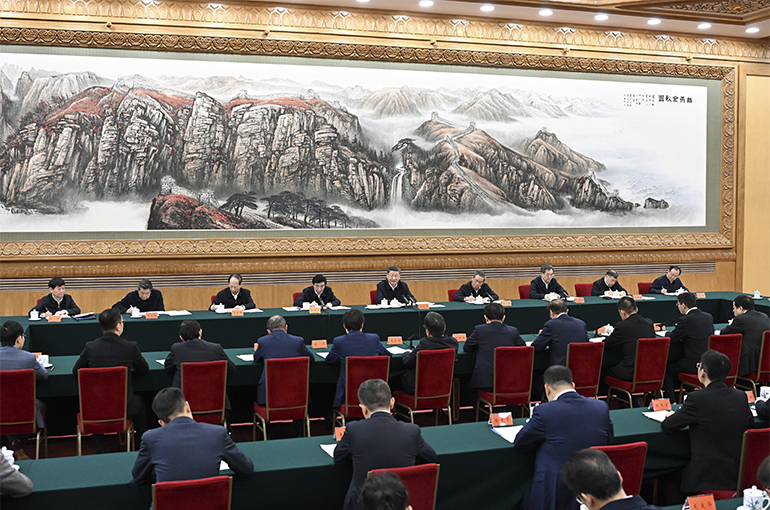 China Holds First High-Level Symposium on Private Economy in Six Years
China Holds First High-Level Symposium on Private Economy in Six Years(Yicai) Feb. 18 -- China has held its first high-level symposium on the private economy since 2018, sending a strong signal to stabilize expectations for the private economy and boost the confidence of private enterprises.
Chinese President Xi Jinping attended the symposium in Beijing yesterday and delivered an important speech after listening to representatives of private entrepreneurs, according to Xinhua News Agency.
Huawei Technologies' Ren Zhengfei, BYD's Wang Chuanfu, New Hope Group's Liu Yonghao, Will Semiconductor's Yu Renrong, Unitree Robotics' Wang Xingxing, and Xiaomi's Lei Jun were among the private entrepreneurs attending the symposium. Representatives from Contemporary Amperex Technology, Chint Group, Alibaba Group Holding, and DeepSeek were also present.
The proportion of technology entrepreneurs has increased at this symposium compared with the one in 2018, as the position of the tech sector in the industrial ecosystem advanced, said Zhang Jun, chief economist at China Galaxy Securities.
This shift reflects a stronger push toward high-end technology, acknowledges the breakthroughs made by private enterprises in areas related to new-quality productive forces, and highlights the policy support for technological innovation, Zhang noted.
The fact that the private enterprises the representatives participating in the symposium are from focus on technological innovation and consumption also highlights the strategic consideration of leveraging private enterprises to lead innovation and promote domestic demand in the new stage of high-quality development, Teng Tai, director of the Wanbo New Economic Research Institute, told Yicai.
The remarks made at the symposium address the immediate concerns of market players and inject institutional momentum into the development of the private economy, which will effectively boost confidence and consolidate the fundamentals of the improving economy, Teng said.
The symposium conveyed three key messages, according to Liu Xingguo, senior researcher at the China Enterprise Confederation.
The first message is that China has consistently high regard for the development of the private economy as it requires governments at all levels to fully implement the policies and measures of the CPC Central Committee and State Council to promote the development of the private economy, create a favorable environment, and remove institutional barriers for private companies, Liu said.
Secondly, China expressed high expectations for the development of new-quality productive forces in the private economy, Liu noted. The structure of the entrepreneurs participating in the symposium fully reflects the country's emphasis on the growth of emerging industries in the private sector.
The third key message was setting directional requirements for private entrepreneurs, including lawful and compliant operations, improving their development quality, proactively fulfilling historical missions, and serving national and social development, Liu pointed out.
"We have now greater confidence in the future development of private enterprises and are more determined to pursue technological innovation and self-reliance," Xu Ming, founder, chairman, and chief executive officer of private Chinese satellite internet startup GalaxySpace, who participated in the symposium, told Yicai.
Looking ahead, GalaxySpace will continue to drive major technological innovations, integrate with industries such as smart manufacturing and artificial intelligence, and seize the opportunities of the new round of industrial upgrading, Xu noted.
"We will persist in our efforts in space infrastructure construction, contribute to the development of space and technological power, and help advance Chinese modernization," he added.
China has introduced in recent years a series of policies aiming to optimize the development environment of the private economy, increase policy support, bolster legal protection, and promote high-quality development.
In July 2023, the State Council issued a guideline on boosting the growth of the private economy, which included 31 measures covering areas such as improving the business environment, enhancing policy support, and fortifying legal guarantees. Afterward, the National Development and Reform Commission and other departments released a series of complementary measures, proposing 17 specific initiatives to enhance the willingness and capacity of private investment.
In December 2023, the Standing Committee of the National People's Congress included a draft of the private economy promotion law in its legislative plan. After passing the first review at the end of last year, the law is expected to undergo further review at the 14th session of the Standing Committee of the 14th NPC later this month, according to Xinhua.
The private economy promotion law explicitly affirms the equal status of the public and private economy in legal form and incorporates core concerns such as fair competition, promotion of investment and financing, and protection of rights and interests into the institutional framework.
As these policies take effect, key indicators for the private economy have shown positive improvements. Private investments, excluding real estate development, grew 6 percent last year from the previous one. The total profit of Chinese private enterprises rose 0.5 percent to CNY2.32 trillion (USD323 billion), while the total profit of industrial enterprises above the designated size fell 3.3 percent to CNY7.43 trillion in the period.
Editor: Futura Costaglione